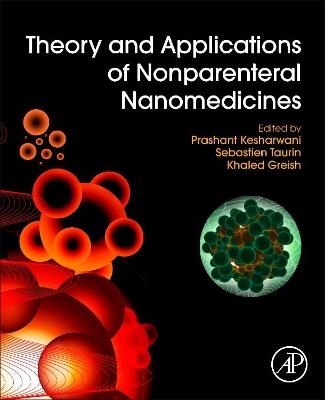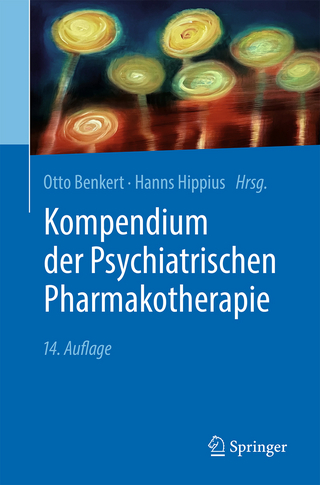
Theory and Applications of Nonparenteral Nanomedicines
Academic Press Inc (Verlag)
978-0-12-820466-5 (ISBN)
Beginning with a brief introduction to the non-parenteral delivery of nanomedicine and the safety and regulatory implications of the nanoformulations, further chapters discuss the physiology of the biological barriers, the specificity of the nanocarriers as well as their multiple applications. Theory and Applications of Nonparenteral Nanomedicines helps clinical researchers, researchers working in pharmaceutical industries, graduate students, and anyone working in the development of non-parenteral nanomedicines to understand the recent progress in the design and development of nanoformulations compatible with non-parenteral applications.
Dr. Prashant Kesharwani is an assistant professor of pharmaceutics at School of Pharmaceutical Education and Research, Jamia Hamdard, New Delhi, India. He has more than 12 years of teaching, research, and industrial experience at international levels from various countries, including the United States, Malaysia, and India. An overarching goal of his current research is the development of nanoengineered drug delivery systems for various diseases. He has more than 300 international publications in well-reputed journals and more than 25 international books (Elsevier). He is a recipient of many research grants from various funding bodies. He is also the recipient of several internationally acclaimed awards, such as “USERN Laureate award, most prestigious “Ramanujan Fellowship Award. He actively participates in outreach and scientific dissemination for the service of the wider community. Dr. Sebastien Taurin is Associate Professor of Molecular Medicine at Arabian Gulf University, Kingdom of Bahrain. He previously worked at the University of Utah in the department of Gynecology and obstetrics and the University of Otago in the Department of Pharmacology and Toxicology. He held a postdoctoral fellowship at the University of Chicago in the Section of Pulmonary and Critical Care Medicine. He is a researcher focused on cancer treatment, cancer cell signaling adaptation and heterogeneity, and modelization. Dr. Khaled Greish is Professor of Molecular Medicine, and head of the Nano-research unit, at Princes Al-Jawhara Center, Arabian Gulf University, Kingdom of Bahrain. His previous appointments included Senior lecturer of Pharmacology at the University of Otago, New Zealand, and Assistant Professor of Pharmaceutical Chemistry at University of Utah (UT, USA). He has published > 70 peer reviewed papers, and 10 book chapters in the field of targeted anticancer drug delivery. Controlled Release Society (CRS) awarded him the CRS Postdoctoral Achievement Award in 2008 and in 2010; he was elected as member of the CRS College of Fellows. In recognition of his research, University of Otago awarded him “Early Career Awards for Distinction in Research in 2014. His research focuses on Nanomedicine, tumor vascular biology, and anticancer drug discovery/development.
1. Introduction: An Overview of the non-parenteral delivery of nanomedicine2. Challenges in non-parenteral nanomedicine therapy3. Regulatory implication of non-parenteral nanomedicine4. Physiology of the biological barriers5. Mucoadhesive polymers in the design of nanocarrier6. Mucoadhesive polymers, lipids used in solid lipid nanoparticles7. Mucus penetrating nanocarrier8. Nanomedicines developed for ocular drug delivery9. From the nose to the brain, nanomedicine drug delivery10. Oral drug delivery of nanomedicines11. Nanomedicine for inflammatory bowel disease12. Nanomedicine for vaginal drug delivery13. Nanomedicine in reproductive biology14. Regenerative nanomedicine, emerging non-parenteral applications15. Electrospun nanofibers for wound healing16. Nanomedicine in pulmonary delivery17. Nanomedicine and pain management18. Transdermal delivery of nanomedicine19. Nanomedicine and insulin delivery20. Non-parenteral nanoparticles in consumer products21. Post-operative local administration of nanomedicine22. Hydrogel for therapeutic delivery of nanomedicine23. Regulatory pathway to introduce a nanomedicine product on the market at international level24. Non-parenteral nanoparticles in consumer products
| Erscheinungsdatum | 21.09.2020 |
|---|---|
| Verlagsort | San Diego |
| Sprache | englisch |
| Maße | 191 x 235 mm |
| Gewicht | 1020 g |
| Themenwelt | Medizin / Pharmazie ► Medizinische Fachgebiete ► Pharmakologie / Pharmakotherapie |
| Medizin / Pharmazie ► Pharmazie | |
| Medizin / Pharmazie ► Physiotherapie / Ergotherapie ► Orthopädie | |
| Technik ► Medizintechnik | |
| Technik ► Umwelttechnik / Biotechnologie | |
| ISBN-10 | 0-12-820466-4 / 0128204664 |
| ISBN-13 | 978-0-12-820466-5 / 9780128204665 |
| Zustand | Neuware |
| Informationen gemäß Produktsicherheitsverordnung (GPSR) | |
| Haben Sie eine Frage zum Produkt? |
aus dem Bereich


